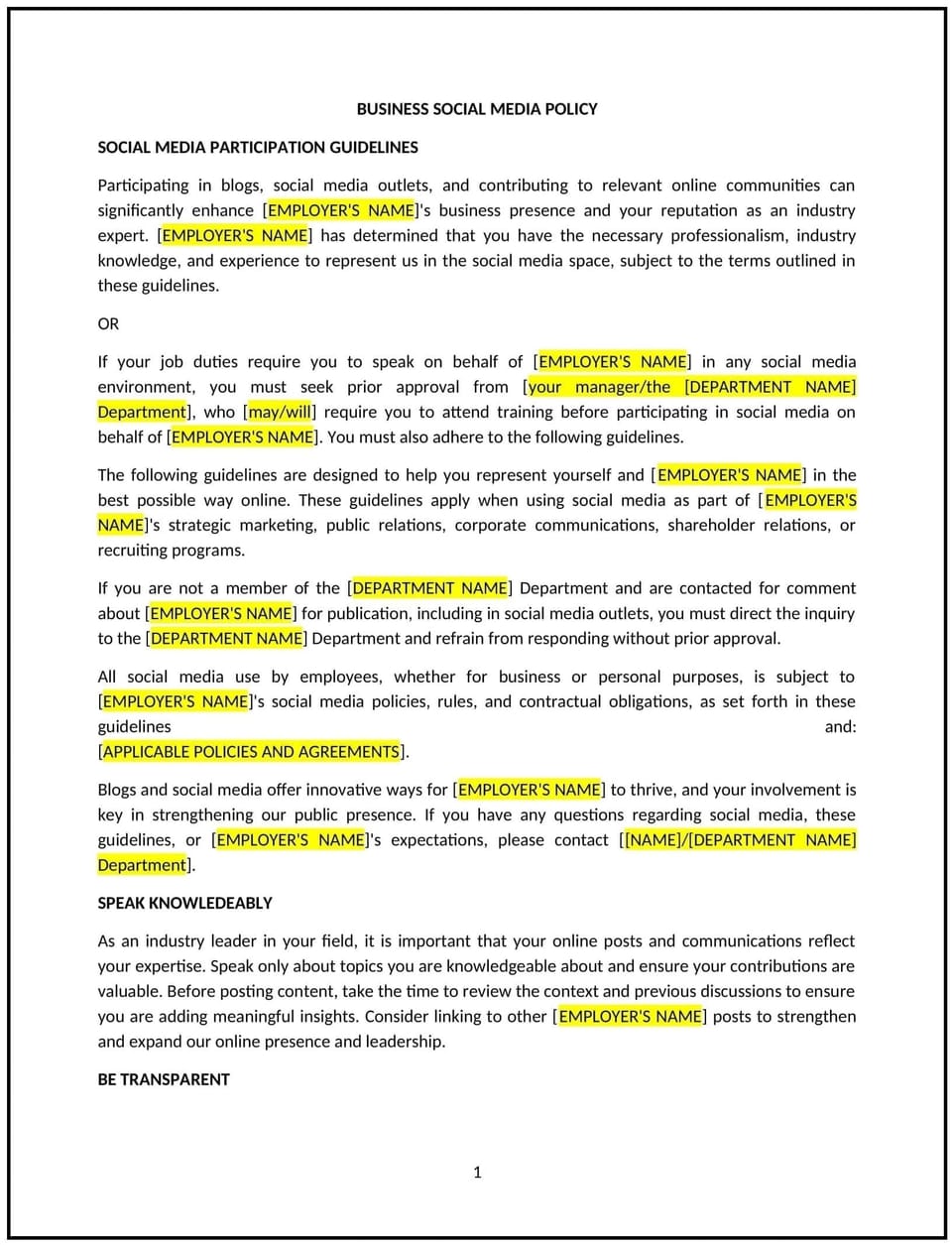Business social media policy (Kentucky): Free template

Business social media policy (Kentucky)
A business social media policy provides Kentucky businesses with guidelines on the appropriate use of social media platforms by employees. This policy outlines expectations for professional conduct, confidentiality, and brand representation, helping businesses protect their reputation while allowing employees to engage online responsibly.
By adopting this policy, businesses can promote responsible social media use, minimize risks, and maintain a positive online presence.
How to use this business social media policy (Kentucky)
- Define the scope: Clearly state which social media activities the policy covers, including personal and professional use of platforms such as LinkedIn, Facebook, Twitter, and Instagram.
- Set guidelines for professional conduct: Outline expectations for respectful and responsible behavior online, ensuring that employees’ posts align with the company’s values and standards.
- Address brand representation: Specify rules for employees posting on behalf of the business, including the approval process for content and use of official accounts.
- Emphasize confidentiality: Remind employees not to share sensitive company information, trade secrets, or private details about clients, partners, or coworkers on social media.
- Include personal use parameters: Clarify boundaries for personal social media use during work hours or while using company resources.
- Explain consequences for policy violations: Detail potential outcomes for inappropriate social media use, such as warnings, suspension, or termination.
- Promote education: Provide employees with training on responsible social media use, including tips for avoiding common pitfalls and maintaining professionalism online.
Benefits of using this business social media policy (Kentucky)
This policy offers several benefits for Kentucky businesses:
- Protects the company’s reputation: Establishes clear guidelines for employees’ online behavior, reducing the risk of damaging posts or comments.
- Encourages professional conduct: Reinforces the importance of maintaining respectful and ethical interactions on social media.
- Safeguards confidential information: Minimizes the likelihood of sensitive data being disclosed or misused online.
- Clarifies responsibilities: Ensures employees understand the boundaries between personal and professional social media use.
- Promotes brand consistency: Provides a framework for managing official social media accounts and maintaining a cohesive brand image.
Tips for using this business social media policy (Kentucky)
- Communicate the policy: Share the policy during onboarding and make it easily accessible for employees to reference as needed.
- Provide examples: Include examples of appropriate and inappropriate social media behavior to help employees understand the policy’s expectations.
- Encourage transparency: Foster a culture where employees feel comfortable asking questions about social media use or seeking clarification on the policy.
- Monitor online activity: Regularly review posts on official accounts and address any concerns promptly to maintain a positive brand image.
- Review and update regularly: Adapt the policy to reflect changes in social media platforms, workplace practices, or Kentucky laws.
Q: What is the purpose of a business social media policy?
A: The policy provides guidelines for employees’ social media use to protect the company’s reputation, ensure professionalism, and safeguard confidential information.
Q: Does this policy cover personal social media accounts?
A: The policy applies to personal accounts when employees’ posts could affect the company’s reputation, involve work-related content, or occur during work hours.
Q: What are employees’ responsibilities when posting on behalf of the company?
A: Employees must follow content approval processes, use official accounts appropriately, and ensure their posts align with the company’s values and brand.
Q: Can employees use social media during work hours?
A: The policy clarifies expectations for personal social media use during work hours, which should not interfere with job responsibilities.
Q: How does the policy address confidentiality?
A: Employees are prohibited from sharing sensitive company information, trade secrets, or private details about clients or coworkers on social media.
Q: What happens if an employee violates the social media policy?
A: Policy violations may result in disciplinary action, including warnings, suspension, or termination, depending on the severity of the issue.
Q: Does the policy provide training on social media use?
A: Yes, the policy includes education on responsible social media practices and tips for maintaining professionalism online.
Q: How often should the social media policy be reviewed?
A: The policy should be reviewed annually or as needed to reflect changes in workplace practices, social media trends, or Kentucky laws.
This article contains general legal information and does not contain legal advice. Cobrief is not a law firm or a substitute for an attorney or law firm. The law is complex and changes often. For legal advice, please ask a lawyer.


